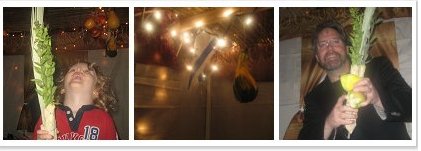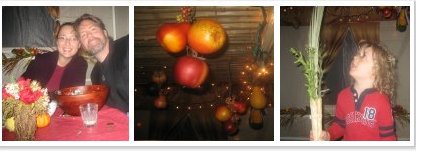|
|
|||||||||||||||||||||
 |
|||||||||||||||||||||
|
Learn Hebrew |
|||||||||||||||||||||
 |
|||||||||||||||||||||
|
Learn Torah |
|||||||||||||||||||||
|
October 2007 Updates Your prayers for my health (see below) are sincerely appreciated, chaverim. I'll praise You in this storm...  10.29.07 I went to ER yesterday... the pain was too much. I was put on an IV drip (anti-inflammatory and morphine). It helped, but I have got to tell you that this pain was excruciating..... My prayers were right out of the fire. I know many of you know what I mean. Parashat Chayei Sarah 10.27.07 I updated the Torah reading for this coming Shabbat (Chayei Sarah), which continues the great story of God's sovereign love for Abraham and his family. 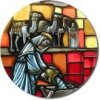
New Hebrew Glossary Quiz: Middot HaLev 10.27.07 Words and definitions mean little apart from their historical and cultural context. In order to understand the meaning of a word, it's always good idea to understand both its history (etymology) and also its usage over the millennia. To expedite your level of literacy, I began working on a simple flash program that lets you to quiz yourself on 50 Hebrew words/phrases that represent some contemporary Jewish values (middot halev). Let me know if you like this idea. I can add sound to each word as well. New Hebrew Meditation 10.25.07 There are times when the only prayer I can muster is a simple, "Help, Lord!" -- usually said when I am wrestling with anxiety or difficulties of one kind or another. Living in the "already-not-yet" state of redemption is a soul-building venture that helps us to acquire the precious middah (quality) of patience: "In your patience possess ye your souls" (Luke 21:19). Today I wrote another (very brief) Hebrew meditation based on Psalm 38:22 (Make haste to help me) that I hope might encourage you to persevere despite whatever trials you are facing, chaverim. Suffering produces endurance (Rom. 5:3), but God surely is faithful "to keep you from falling, and to present you faultless before the presence of his glory with exceeding joy" (Jude 1:24). 
Parashat Vayera 10.23.07 I updated the weekly Torah portion for this coming Shabbat (Vayera).  This wonderful portion of Torah includes the Akedat Yitzchak ("binding of Isaac"), the story of how Abraham was tested by God to bind his beloved son Isaac and offer him as a sacrifice on Mount Moriah, the place of the future Temple. At the last moment, God stopped him from going through with the sacrifice and provided a substitute. Abraham then named the site Adonai-Yireh, "the LORD who sees." As Messianic believers, we understand the Akedah as a foreshadowing of the ultimate sacrifice the heavenly Father would give on our behalf. Unlike Abraham, God the Father actually offered His only Son upon Moriah in order to make salvation available to all who believe. As Abraham said, Elohim yireh-lo haseh ("God Himself will provide a lamb"). According to Jewish legend, God chose the site for His Holy Temple in order to honor brotherly love.
Dealing with Pain... 10.22.07 Well I finally couldn't take it anymore. I went to the doctor today and they think I have a compressed disk in my neck. That explains the neck/shoulder/arm pain and numbness I have experienced the last few months. I am scheduled to see an occupational therapist later this week. Meanwhile I am on some drugs to help me get some sleep, reduce the inflammation...etc. I appreciate any prayers you can offer for me and this ministry.
A word of thanks to you... 10.19.07 I want to thank each and every person who has helped Hebrew4Christians stay online over the last couple years. As you might already know, I am not paid by a church, synagogue or other organization for my work here, so whatever I do at this site (and on the forums) is done on my own time and effort. When you email me with a kind word or offer a donation, it really lifts my spirit and encourages me to go on, despite some setbacks I've faced over the last year. Please know that I deeply appreciate your love, support, and especially your prayers. Kol tuv, chaverim. Meshumad? 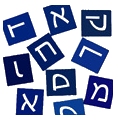 10.18.07 A Messianic friend recently remarked to me, "Jews don't need to convert to Christianity; they just need to be "completed," like the Apostle Paul who became a completed Jew." Now what do we make of such a statement? Click here for some thoughts concerning the question.
The Olive Tree Metaphor 10.17.07 I created the following simple flash animation to help visualize the relationship between Israel and the Church (for a detailed examination, click here). And for additional information about God's sovereign plan concerning Israel, please read Romans chapter 11.
Parashat Lekh Lekha 10.16.07 I updated the weekly Torah portion (Lekh Lekha) for this coming Shabbat. 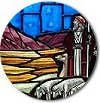 Please keep me and my family in your prayers, friends. I have been experiencing a lot of pain as a result of going without sleep the last few years. You might not know this, but I am not paid by a church, synagogue or other organization for my work here. All that I do at this site (and on the forums) is done on my own time -- and often at the expense of sleep. Please ask the LORD to impart supernatural grace to keep going. I am also starting to write a new book that I hope will be of value to many of you. Simply put, your prayers for my health are absolutely vital for this ministry to continue. Shalom.
Sabbatical Rest ...because the plowman should plow in hope and the thresher thresh in hope of sharing in the crop (1 Cor. 9:10) 10.12.07 I will be on sabbatical from heavy development of this site for awhile, though I will still update the weekly Torah portion. I hope to develop a new book during this time, should it please God. Shalom chaverim. 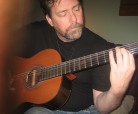
Yiddish, Yiddish, Oy! Bim-bim-bam! 10.11.07 I added some more Yiddish words and soon hope to create a flashcard applet that you can use to review your Yiddish (and Hebrew) vocabulary. However, time is limited and I am still wrestling with a lot of chronic pain, so I am unsure if I will be able to find the energy to create this.
Noah as a picture of Yeshua 10.09.07 I updated the weekly Torah portion for this coming Shabbat (Noach). For some additional drash, read below.  Noach's name comes from the shoresh (root) nacham, meaning to comfort. Other Hebrew words that use this root include nichum (compassion), nuach (rest), and menuchah (rest from work). Noach's very name foreshadowed the coming of Yeshua. His father Lamech (meaning "powerful one") regarded Noach as a deliverer who would comfort us from the ravages of the curse (Gen. 3). In like manner it was prophesied that Yeshua would give us everlasting rest: "His rest shall be glorious" (Isa. 11:10), and He offers rest to the weary (Matt. 11:28, Heb. 4:9). His sacrifice on the Cross at Moriah undoes the kelalah (curse) over the children of Adam. Indeed, His life, sacrifice, and resurrection was like a "magic spell" that "spoke backwards" the sin of the "First Adam" - and by means of His deliverance the power of the curse was forever broken (Gal. 3:13, John 3:14, 2 Tim.1:10; Heb. 2:14; Heb. 9:27-28; 1 John 3:8, Rev. 22:3). By means of His Spirit we are given an everlasting comfort (John 14:16). Eschatologically, the "days of Noach" are a picture of the idolatrous conditions of the world that prevail just before the calling up of the followers of the Mashiach Yeshua before the time of Great Tribulation upon the earth: "As were the days of Noah, so will be the coming of the Son of Man" (Matt. 24:37). The seven day warning given to Noach suggests the seven year tribulation period to come (Daniel's 70th week). But please note that "the LORD shut him in" (Gen. 7:16). Noach's teivah had God Himself as its designer (Gen. 6:15f), and salvation in Yeshua is by God's design (Jonah 2:9; Eph. 1:9, 1:11). Noach's ark contained only one door (Gen. 6:16), just as Yeshua is the only door to salvation (John 10:9). Noach's ark contained three levels (Gen. 6:16) and salvation has three own experiential levels (2 Cor. 1:10): past, present, and future. In the past (at Moriah) Yeshua delivered us from the penalty of sin; in the present, He is delivering us from the power of sin; and in the future He will deliver us from the very presence of sin. Baruch Hashem - may that day come soon!
Yiddish Glossary Updates 10.08.07 Today I added a few more words to the Yiddish Glossary section of the site. I hope you find them useful.... I am quite relieved that the holidays have finally ended (even though they are precious and meaningful times, of course). I am in serious need of a rest and for some physical healing chaverim. My arms and left shoulder are constantly hurting. I think I have some sort of nerve damage to the shoulder. Please offer up a prayer for me. I can only sleep for a few hours and then wake up in a lot of pain. I takes hours before the pain diminishes. This really wearies me. Thank you so much. 
Chazak! Chazak! 10.05.07 (Simchat Torah, 5768) I updated the weekly Torah portion (Bereshit) and created a new PDF file for you to download. If you have been regularly reading and studying Torah with me, rejoice that we have completed the last book of Torah (Devarim) and are now begining anew with Bereshit (Genesis). 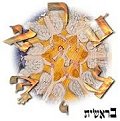 During the concluding pasuk of each book of the Torah it is customary for the congregation to stand as the Torah reader reads the final words. Then, in a dramatic manner, he signals to the congregation, who then respond with "Chazak, chazak, ve-nit chazek" (Be strong, be strong, and let us be strengthened!): This is a cry of encouragement to continue with the reading of the next book, and to return to this one again in due course. This custom may be derived from the words of Joshua to the children of Israel, "chazak ve'ematz" (be strong and courageous).
Simchat Torah! 10.05.07 (Simchat Torah, 5768) Shalom chaverim v'chag sameach. How good is God to give us the precious gift of His Word! Torah joy is our song tonight! 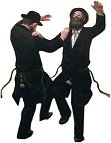 I am considering starting a new book project, the details of which I cannot not disclose at this time. If you have a heart for this ministry, I earnestly ask you to pray for me -- for wisdom, grace, and strength. I will provide more details later. Todah rabbah and kol tuv.
Celebrating Sukkot 10.04.07 (Sukkot 7, 5768) Here are even more pictures of our sukkah taken this evening, chaverim. Our lulav is pretty dried out now and our etrog has shrunk a bit, but we look forward to that coming day when all of us will tabernacle together with the Lord in His coming glorious kingdom (Ezek. 37:26-28, Zech. 14:16-17, Rev. 20:2-7).
The last words recorded of Yeshua are: "Surely I come quickly" (Rev. 22:20):
This statement of intent is immediately followed by the last prayer recorded in the NT: "Even so, come, Lord Jesus":
When Yeshua comes -- and He surely will -- He is returning directly to Jerusalem to rule as Mashiach ben David over Israel (Isa. 9:3-7; 11:1-10, Luke 1:32-33; Rev. 20:2-7). Then will be gloriously fulfilled all the covenantal promises given to Abraham and King David (and attested to by the Hebrew prophets). King David himself will be resurrected to function as Yeshua's regent (Jer. 33:15,17,21; Amos 9:11), and other tzaddikim will rule as well (Isa. 32:1; Matt. 19:28). Jerusalem, the great "City of God," will finally be the political and spiritual center of the world (Zech. 8:3).
Shemini Atzeret and Simchat Torah 10.03.07 (Sukkot 7, 5768) Last night began Hoshana Rabbah, or the "Great Salvation," a climactic time of praise to the LORD. It is a common practice is to stay awake all night when Hoshana Rabbah begins, reading the book of Deuteronomy and Psalms in preparation for Simchat Torah (which in Israel begins the following day, though in the Diaspora, occurs the day after the intermediate day of Shemini Atzeret). Piska Tava b'Yeshua. 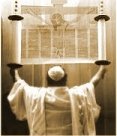 Yeshua (Jesus) is of course the Central Message of the Torah -- its inner meaning and incarnation. He is the Torah made flesh (John 1:14), the faithful Mediator of the New and Better Covenant (Hebrews 8:6), and He does what Moses and the Sinatic covenant could never do, namely, write the Torah within our inward parts and upon our hearts so that we might truly be the people of God (Jeremiah 31:31-34). By means of His sacrificial death, the righteous demands of Torah are fully satisfied, and the LORD is glorified as both just and merciful (i.e., the justifier of those who put their trust in Him). The Torah (i.e., law) is holy, just and good (Rom. 7:12), but those seeking righteousness based on it's demands will discover the tragic fact that it is powerless to impart righteousness and life (2 Cor. 3:7-18). It is sin within the human heart that condemns people - not the Torah. The crucifixion of Yeshua condemned sin in the flesh (again, it did not condemn the Torah) and now the righteousness of God is imparted to those who embrace Yeshua by faith (Rom. 8:3-4). Enabled by the Holy Spirit, with the Torah now written upon our hearts (Jer. 31:31-3; Heb. 8:10-11), we are empowered to fulfill the requirements of the law based on a new covenant relationship with God (Gal. 2:16, 3:2). We no longer seek righteousness by means of maintaining ritualistic or other ordinances (Rom. 4:5, Gal. 2:16) but by receiving the free gift of Mashiach's righteousness imputed to us through our trust (Eph. 2:8-9). Because of Yeshua's victory, we do not strive for acceptance before the Father, we abide within it, chaverim…
Joy despite pain.... 10.01.07 (Sukkot 5, 5768) Here are some pictures from our time in the sukkah this evening, chaverim. Chag Sameach and love to you all.
As you can see, we added some further beauty to the sukkah, adding hanging fruit and some additional lights (our custom is to add something of beauty to the sukkah each day for the entire eight days). Note: I have been dealing with a lot of pain lately -- physical pain -- that is hindering me quite a bit (I had a motorcycle crash about 5 years ago. My shoulder got smacked up pretty good. The year before I had a car accident for which I had neck surgery. These are the two places the pain is most acute). I will probably have to go to the doctor to get checked out. Halevai... "For which cause we faint not; but though our outward man perish, yet the inward man is renewed day by day" (2 Cor 4:16). Our trust is in God for refuah shelmah.... and your prayers are sincerely appreciated! 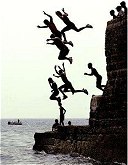 At any rate, I wish you a yom tov and great joy for Sukkot and always. I added about 30 new Yiddish words to the online glossary today, some of which must be used with care (typical of the sardonic nature of Yiddish expression).
|
||||||||||||||||||||||||||||||||||
|
Hebrew for Christians |
||||||||||||||||||||||||||||||||||
|
||||||||||||||||||||||||||||||||||









